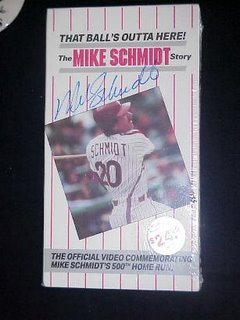Swing and a Long-Held Grudge
 Tonight Ryan Howard hit his 49th home run of the season. In doing so, Howard set a new single-season home run record for the Philadelphia Phillies, surpassing Mike Schmidt's 48 home runs in 1980.
Tonight Ryan Howard hit his 49th home run of the season. In doing so, Howard set a new single-season home run record for the Philadelphia Phillies, surpassing Mike Schmidt's 48 home runs in 1980.
Michael Jack Schmidt was the Phillies' starting third baseman for more than 16 seasons. He was a 3-time MVP, 12-time All-Star and was the World Series MVP for the Phillies one-and-only championship in 1980. He won 10 Gold Gloves and 8 home run titles. When he retired in 1989, he was seventh on the all-time home run list with 548.
As a young boy growing up in suburban Philadelphia, Schmitty was my childhood hero. I collected Mike Schmidt's baseball cards. My favorite number was 20 (his jersey number). I wished I could grow as moustache. I watched Phillies games just so I could wait for him to come to bat. Every kid on my little league team imitated Schmidt's batting stance (and trademark butt-wiggle). And we argued about who would win in a fist fight: Mike Schmidt or Superman (Answer: Mike Schmidt).
In April 1987, Michael Jack hit his 500th home run at Three Rivers Stadium in Pittsburgh. It was a huge milestone in Philadelphia sports history. The day he hit it, my brother Jason and I were at home watching the game on TV. In the 6th inning, the Phillies were losing and our mother dragged us out of the house to go buy shoes. My brother's Bar Mitzvah was coming up and I guess shoes were a higher priority. After picking out just the right pair of junior wingtips, we returned to the car and tuned in the game on the radio. Andy Musser and Chris Wheeler, the Phils' radio broadcasters, were talking excitedly describing the big moment that had just happened. Schmitty had hit number 500. Not only that, it was a game winning shot. It was one of the biggest moments in my hero's career and I was in a shoe store.
To celebrate Schmidt's accomplishment, a commemorative video was released fittingly called "That Ball's Outta Here: The Mike Schmidt Story." It followed Schmidt through the first part of the season as he chased the 500 mark. It showed him on the phone with his wife, fielding questions from the press at his locker and taking extra BP before games. The first time I watched the video, at the moment when they show Schmidt silently swinging in slow motion, connecting for the historic blast, I started to cry. I still get choked up just thinking about that scene. Watching the video was the closest I would come to reliving that moment. Did I mention I was in a shoe store at the time?
When the video went on sale, Schmitty was scheduled to make an appearance at our local video store to autograph copies. I begged my mother to take me along. I had never gotten a chance to meet my hero in person. Here was her chance to make-up for the shoe fiasco. After much pleading, my mother decided I would stay in school that day. I wouldn't be meeting my idol.
My mother still went on her own to the video store. When I got home from school that day, she talked about what it was like to meet him -- how broad his shoulders were and how he seemed so tall even while sitting down. From a bag she pulled out the commemorative video she'd gotten him to sign. In dark, bold writing, it read "To Jason, Happy Birthday. Mike Schmidt." My brother's birthday was coming up soon and my mother had thoughtfully gotten him a personalized autograph. I thought it was so cool that Mike Schmidt knew it was my brother's birthday. I couldn't wait to see my personalized copy of the video, too.
This may come as a surprise, but there was no personalized autograph for me. There was only one copy of the video and it had my brother's stupid name scribbled all over it. My mom said not to worry. She had also managed to get him to autograph a small 4x6 photograph she'd taken of him at a Fuji Film Photo Night at Veterans Stadium a couple years earlier. Wow. I couldn't wait to put it on display in my room.
It was then explained to me that the small autographed photo was to remain inside the video's box, which conveniently lived in a cupboard in my brother's room. I was not allowed to have it.
From time to time, I would go into my brother's room, take out the video and peek at the small autographed photo inside. It reminded me of my mother's own story about her father's Babe Ruth autograph. As a young girl, she would go into her father's desk and pull out an old program with the Babe's signature on the cover. But someone else in the family had made off with it. To this day, she doesn't know where it is.
A few years ago, when I was visiting my parent's house, I went into my brother's old room and for old times sake took out the video. The autographed photo slipped out of the box and fell into my lap. I looked at it for a moment, placed it on the bed and put the video away. I carefully slid the photo into an envelope and put it in my suitcase. The next day, I left with the autograph quietly tucked away. No one in my family would realize it was gone until they came to my home years later and saw it on display, in a frame, being enjoyed.
I've met and had meaningful encounters with a fair share of famous people in my life -- from Bill Cosby to Cal Ripken, Jr. But I don't ask for autographs. Autographs are for kids. Rather than asking people to scribble their name on a piece of paper, I prefer to strike up a dialogue. In my opinion, it makes for a far more memorable connection. How can someone have any respect for you if the first thing you do is ask them to write their name down? But because I've never had personal contact with my boyhood hero, Schmidt's autograph is the only thing I have.
So to my family members that would like the autograph back, I'd like to remind you of the 10-year old boy wiggling his butt and swinging a wiffleball bat in the middle of the living room. If you really want the autograph back, I suggest you schedule a personal audience for me and Michael Jack. Then I will gladly give up the photo. Until then, happy shoe shopping.





